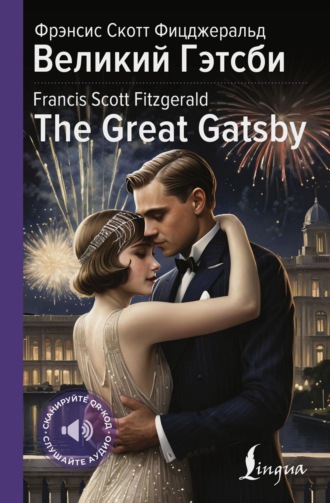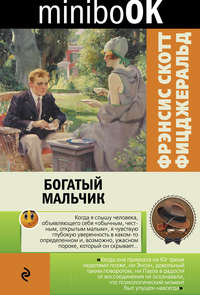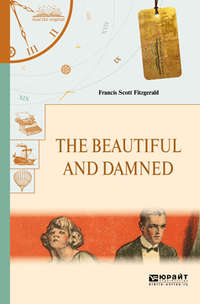
Полная версия
Великий Гэтсби / The Great Gatsby
He did not say another word. His correctness grew on him as we neared the city. We passed Port Roosevelt, and sped along the suburbs. I heard the familiar sound of the motorcycle, and a frantic policeman stood before us.
“All right, old sport,” said Gatsby. We slowed down. Taking a white card from his wallet he waved it before the policeman's eyes.
“All right,” agreed the policeman. “I'll know your automobile next time, Mr. Gatsby. Excuse me!”
“What was that?” I inquired. “The picture of Oxford?”
“I did the commissioner a favor once, and he sends me a Christmas card every year.”
The city seen from the Queensboro Bridge is always the city seen for the first time, it shows its wild mystery and beauty.
“Anything can happen now,” I thought; “anything at all.”
* * *At noon I met Gatsby for lunch. In the anteroom he was talking to a man.
“Mr. Carraway, this is my friend Mr. Wolfsheim.”
Gatsby took an arm of each of us and moved forward into the restaurant.
“This is a nice restaurant here,” said Mr. Wolfsheim looking at the nymphs on the ceiling. “But I like across the street better!”
“It's too hot over there,” agreed Gatsby.
“Hot and small – yes,” said Mr. Wolfsheim, “but full of memories.”
“What place is that?” I asked.
“The old Metropole.”
“The old Metropole,” said Mr. Wolfsheim gloomily. “Filled with faces dead and gone. Filled with friends gone now forever. I can't forget the night they shot Rosy Rosenthal there. It was six of us at the table and Rosy was eating and drinking a lot all evening. When it was almost morning the waiter came up to him with a funny look and said somebody wanted to speak to him outside. 'All right,' says Rosy and begins to get up and I pulled him down in his chair. 'Let the bastards come in here if they want you, Rosy, but don't you.' It was four o'clock in the morning.”
“Did he go?” I asked innocently.
“Sure he went,” Mr. Wolfsheim said indignantly. “He turned around in the door and said, 'Don't let that waiter take away my coffee!' Then he went out and they shot him three times in his full belly and drove away.”
“Four of them were electrocuted,” I said, remembering.
“Five with Becker.” His nostrils turned to me. “I see you're looking for a business connection.”
I was surprised. Gatsby answered for me:
“Oh, no,” he exclaimed, “this isn't the man!”
“No?” Mr. Wolfsheim seemed disappointed.
“This is just a friend. I told you we'd talk about that some other time.”
“I beg your pardon,” said Mr. Wolfsheim, “I had a wrong man.”
Food arrived, and Mr. Wolfsheim began to eat.
“Look here, old sport,” said Gatsby, leaning toward me, “I'm afraid I made you a little angry this morning in the automobile.”
“I don't like mysteries,” I answered. “And I don't understand why you won't come out frankly and tell me what you want. Why do you talk about it with Miss Baker?”
“Oh, no mysteries at all,” he assured me. “Miss Baker's a great sportswoman, you know, and she'd never do anything wrong.”
Suddenly he looked at his watch, jumped up and hurried from the room leaving me with Mr. Wolfsheim at the table.
“He has to telephone,” said Mr. Wolfsheim, following him with his eyes. “Fine fellow, isn't he? Handsome and a perfect gentleman.”
“Yes.”
“He's an Oxford man.”
“Oh!”
“He went to Oxford University in England. Do you know Oxford University?”
“I've heard of it.”
“It's one of the most famous universities in the world.”
“Have you known Gatsby for a long time?” I inquired.
“Several years,” he answered. “I made the pleasure of his acquaintance just after the war. I said to myself: 'It's the man you can introduce to your mother and sister.' “ He paused. “I see you're looking at my cuff buttons.”
I was not looking at them, but I did now.
“Real human teeth,” he informed me.
“Well!” I inspected them. “That's a very interesting idea.”
“Yeah. You know, Gatsby's very careful about women. He will never look at a friend's wife.”
When Gatsby returned to the table and sat down, Mr. Wolfsheim drank his coffee and stood up.
“Thank you for the company,” he said.
“Don't hurry, Meyer,” said Gatsby, without enthusiasm.
“You're very polite but I belong to another generation,” he announced solemnly. “You sit here and discuss your sports and your young ladies and your… As for me, I am fifty years old.”
He shook hands and turned away.
“He becomes very sentimental sometimes,” explained Gatsby. “This is one of his sentimental days. He's well-know in New York.”
“Who is he anyhow – an actor?”
“No.”
“A dentist?”
“Meyer Wolfsheim? No, he's a gambler.”
I noticed Tom Buchanan.
“Come along with me for a minute,” I said. “I'll say hello to someone.”
When he saw us Tom jumped up.
“Where've you been?” he demanded eagerly. “Daisy's furious because you disappeared.”
“This is Mr. Gatsby, Mr. Buchanan.”
They shook hands briefly.
“How've you been, anyhow?” demanded Tom of me. “Why did I meet you here?”
“I was having lunch with Mr. Gatsby.”
I turned toward Mr. Gatsby, but he was no longer there.
* * *One October day in nineteen-seventeen – (said Jordan Baker that afternoon, sitting up very straight on a straight chair in the tea-garden at the Plaza Hotel) – I was walking along from one place to another. I saw the red, white and blue banners in front of all the houses. The largest of the banners belonged to Daisy Fay's house. She was just eighteen, two years older than me, and the most popular of all the young girls in Louisville. She was wearing white dresses, and the telephone rang in her house all day long.
When I came opposite her house that morning, she was sitting in her automobile with a lieutenant I had never seen before.
“Hello Jordan,” she called unexpectedly. “Please come here.”
She was speaking, and the officer was looking at Daisy while she was speaking. The officer's name was Jay Gatsby and I had not seen him again for over four years – even after I'd met him on Long Island I didn't realize it was the same man.
That was nineteen-seventeen. By the next year I began to play in tournaments, so I didn't see Daisy very often. Wild rumors were circulating about her – how she was packing her bag one winter night to go to New York and say goodbye to a military man who was going overseas, and so on.
By the next autumn she was happy again, happy as ever. She was engaged to a man from New Orleans. In June she married Tom Buchanan of Chicago. He came with a hundred people and hired a whole floor of the hotel, and the day before the wedding he gave her a string of pearls valued at three hundred and fifty thousand dollars.
I was bridesmaid. I came into her room half an hour before the bridal dinner. She was lying on her bed – and as drunk as a monkey. She had a bottle of wine in one hand and a letter in the other.
“Gratulate me,” she muttered. “I was never drunk before but oh, how I do enjoy it.”
“What's the matter, Daisy?”
I was scared, I can tell you; I'd never seen a girl like that before.
“Here, dear.” She took a waste-basket and pulled out the string of pearls. “Take it downstairs and give it back to him. And tell them that Daisy has changed her mind. Say 'Daisy has changed her mind!'”
She began to cry – she cried and cried. I rushed out and found the maid and we locked the door and got her into a cold bath. She had the letter all the time. She took it into the tub with her and then it came to pieces like snow.
But she didn't say another word. We put ice on her forehead and dressed her and half an hour later when we walked out of the room the pearls were around her neck and the incident was over. Next day at five o'clock she married Tom Buchanan.
I saw them in Santa Barbara when they came back and I thought I'd never seen a girl so mad about her husband. If he left the room for a minute she'd look around uneasily and say “Where's Tom gone?” She liked to sit on the sand with his head in her lap looking at him with delight. That was in August. A week after I left Santa Barbara Tom ran into a van on the road one night. The girl who was with him got into the papers too because her arm was broken – she was one of the chambermaids in the Santa Barbara Hotel.
The next April Daisy had her little girl and they went to France for a year. I saw them one spring in Cannes and later in Deauville and then they came back to Chicago. Daisy was popular in Chicago, as you know. Her reputation is absolutely perfect. Perhaps because she doesn't drink. It's a great advantage not to drink among hard-drinking people. You can hold your tongue.
Well, about six weeks ago, she heard the name Gatsby for the first time in years. It was when I asked you – do you remember? – if you knew Gatsby. After you had gone home she came into my room and woke me up, and said “What Gatsby?” and when I described him – I was half asleep – she said in the strangest voice that it must be the man she knew. And I connected this Gatsby with the officer in her white automobile.”
When Jordan Baker had finished her story we had left the Plaza. We were driving through Central Park.
“It was a strange coincidence,” I said.
“But it wasn't a coincidence at all.”
“Why not?”
“Gatsby bought that house so that Daisy would be just across the bay. He wants to know, if you'll invite Daisy to your house some afternoon and then let him come over.”
The modesty of the demand shook me. He had waited five years and bought a mansion so that he could “come over” some afternoon to a stranger.
Something worried me.
“Why didn't he ask you to arrange a meeting?”
“He wants her to see his house,” she explained. “And your house is right next door.”
“Oh!”
“I think he was expecting her to one of his parties, some night,” went on Jordan, “but she never came. Then he began to ask people if they knew her, and I was the first one he found. When I said you were a particular friend of Tom's he wanted to cancel the whole idea. He doesn't know very much about Tom, though he says he's read a Chicago paper for years just to see Daisy's name.”
It was dark now, I put my arm around Jordan's golden shoulder and drew her toward me and asked her to dinner.
“And Daisy must have something in her life,” murmured Jordan to me.
“Does she want to see Gatsby?”
“She doesn't know anything about it. Gatsby doesn't want her to know. You'll just invite her to tea.”
Chapter 5

When I came home to West Egg that night I was afraid for a moment that my house was on fire. Two o'clock and everything was blazing with light. Turning a corner I saw that Gatsby's house was lit from roof to cellar.
At first I thought it was another party. But there wasn't a sound. Only wind in the trees which blew the wires. My taxi went away and I saw Gatsby. He was walking toward me across his lawn.
“Your place looks like the world's fair,” I said.
“Does it?” He turned his eyes toward it absently. “Let's go to Coney Island, old sport. In my automobile.”
“It's too late.”
“Well, then maybe a swimming pool? I haven't used it all summer.”
“I've got to go to bed.”
“All right.”
He waited, looking at me.
“I talked with Miss Baker,” I said after a moment. “I'm going to call up Daisy tomorrow and invite her over here to tea.”
“Oh, that's all right,” he said carelessly. “I don't want to put you to any trouble.”
“What day would suit you?”
“What day would suit YOU?” he corrected me quickly. “I don't want to put you to any trouble, you see.”
“How about the day after tomorrow?” He considered for a moment. Then, with reluctance:
“I want to get the grass cut,” he said.
We both looked at the grass. I suspected that he meant my grass.
“There's another little thing,” he said uncertainly, and hesitated.
“So maybe later?” I asked.
“Oh, it isn't about that. At least… Why, I thought – why, look here, old sport, you don't make much money, do you?”
“Not very much.”
This reassured him and he continued more confidently.
“I thought you didn't, if you'll pardon my – you see, I carry on a little business, you understand. And I thought that if you don't make very much – you're selling bonds, aren't you, old sport?”
“Trying to.”
“Well, this would interest you. It wouldn't take up much of your time and you might pick up a nice bit of money. But it is rather confidential.”
I realize now that under different circumstances that conversation might change my life. But the offer was tactless enough. I had to refuse.
“I'm very busy at the moment,” I said. “I'm much obliged but I can't work more.”
“You won't have any business with Wolfsheim.”
He waited a moment longer, hoping I'd begin a conversation, but I did not want to talk to him, so he went unwillingly home.
I called up Daisy from the office next morning and invited her to come to tea.
“Don't bring Tom,” I warned her.
“What?”
“Don't bring Tom.”
“Who is 'Tom'?” she asked innocently.
It was a rainy day. At eleven o'clock a man in a raincoat with a lawn-mower tapped at my front door and said that Mr. Gatsby had sent him over to cut my grass. At two o'clock many flowers arrived from Gatsby's. An hour later the front door opened nervously, and Gatsby in a white flannel suit, silver shirt and gold-colored tie went in. He was pale and there were dark signs of sleeplessness beneath his eyes.
“Is everything all right?” he asked immediately.
“The grass looks fine, if that's what you mean.”
“What grass?” he inquired. “Oh, the grass in the yard.”
He looked out the window at it, but I don't think he saw a thing.
Конец ознакомительного фрагмента.
Текст предоставлен ООО «Литрес».
Прочитайте эту книгу целиком, купив полную легальную версию на Литрес.
Безопасно оплатить книгу можно банковской картой Visa, MasterCard, Maestro, со счета мобильного телефона, с платежного терминала, в салоне МТС или Связной, через PayPal, WebMoney, Яндекс.Деньги, QIWI Кошелек, бонусными картами или другим удобным Вам способом.
Примечания
1
New Haven – имеется в виду Йельский университет (который находится в городе Нью-Хейвен).
2
police dogs – овчарки
3
Carnegie Hall – Карнеги-холл (концертный зал в Нью-Йорке, один из самых престижных в мире для исполнения классической музыки)
4
bootlegger – бутлегер (подпольный торговец спиртным во время сухого закона в США)














